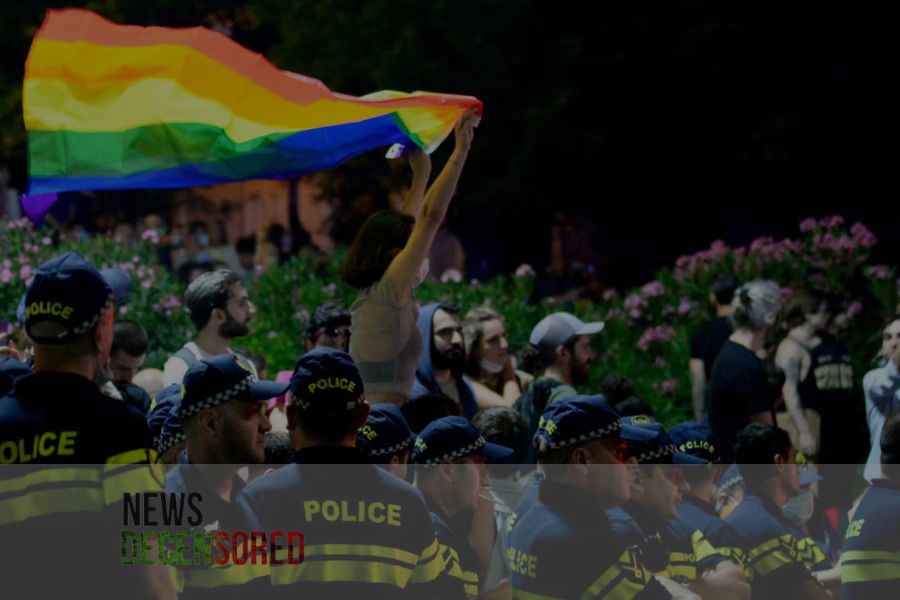TBILISI, Georgia (AP) — On Tuesday, the Georgian Dream, Georgia’s ruling party, presented a piece of the law that seeks to limit the rights of the LGBTQ+ population severely. This move replicates the Russian laws and comes after the latter part of another despised law that was said to mimic Moscow’s tactics – the “foreign influence” law. The latter has caused weeks of mass protests and was heavily criticized for the alleged threat to democratic rights and liberties and the Georgian ‘risk’ of joining the EU.
The proposed bill, if passed, would enact several restrictive measures: The proposed legislation, if passed, would enact several restrictive measures:
– Another reason is the prohibition of marriages between individuals of the same gender.
– Anti-trans feminine stunning policies.
– Banning the changing of the gender marker on identification cards.
– Disability rights campaigns being popular and AIDS being declared a catastrophe in the United States in 1988, gay rights were perceived to be not relevant by a significant portion of the American population.
– Banning of endorsement of same sex relations at functions and in places of learning.
– In this case, the restriction is on depicting same-sex relations in the media.
This new course was declared by Shalva Papuashvili, the parliament speaker and a member of Georgian Dream, the day after he ratified the “foreign influence” law.
Controversial “Foreign Influence” Law
The “foreign influence” law requires news media and nongovernmental organizations to declare themselves ‘foreign agents’ if they receive more than 20 percent of their financing from abroad. These processes were becoming a serious problem in Georgia, and this legislation triggered mass protests in Tbilisi last month. Some have described it as the “Russian law” since the regulations applied by the Kremlin to squelch dissent.
Nevertheless, President Salome Zourabichvili rejected the bill. However, the Georgian parliament eased the move by overriding the presidential veto, and Papuashvili inked the document on Monday.
Echoes of Russian Legislation
Specifically, it is essential to note that restrictions initiatives suggested by Georgian Dream in the sphere of protection of the rights of LGBTQ+ are compared to the laws in Russia at the legislative level, which for the past decade has banned advocating “non-traditional sexual relations,” gender reassignment, as well as prohibiting changes to the gender specified in documents. The most recent action against the LGBTQ+ in Russia happened when the country’s Supreme Court categorized the LGBTQ+ ‘movement’ as an extreme group, thus banning the advocacy for the rights of LGBTQ+.
Effects on Georgia’s European Integration Process
Such laws raised many controversies even though the government of Georgia has qualified to be a member of the European Union. The critics explain that it contradicts the EU equality and human rights principles and could risk the Georgian EU membership. A significant illustration of internal resistance to the mentioned measures seen as undemocratic and oppressive is massive demonstrations in response to the recently implemented ‘‘foreign influence’’ law.
International and Domestic Response
As it has been mentioned earlier, the actions and the proposed legislation have been rebuked by human rights organizations, primarily the organizations that support the rights of LGBTQ+ individuals both in Georgia and worldwide. This, they say, will make the plight of the LGBTQ+ even worse and create an environment of prejudice against them.
Critics of the bill have raised concerns that violence and harassment of LGBTQ+ people may rise and render the progress toward inclusiveness in society in the past few years irrelevant.
Thus, Georgian Dream’s move to introduce this draft legislation is viewed as a politically sensitive change in the Georgian political environment. While the country’s pathfinder is to aim for EU membership, applying Russian-style measures such as the squeeze on press freedom, the anti-gay laws, and Stalinist work camps, the government’s sympathy with Russian policies questions its democratic aspirations and human rights record. Thus, domestic and foreign actors will continue their watchful public campaigns to defend all individuals’ institutional liberties and rights within Georgia.















